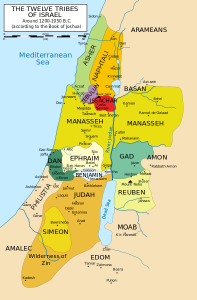If this is your first viewing, please see my Introduction before reading this.
11 March. Joshua chapters 1-4
Each of these chapters recounts a discrete incident in the story of the beginning of the occupation of Canaan. Chapter 1 is where Joshua is given command of the nation, a great responsibility. And even though he has the rare privilege of hearing God’s voice to him personally (as Moses did) still he has to be told four times (thrice by God and once by his own men) “be strong and [very] courageous”. A leader of a nation, especially in times of war, does need these attributes, and yet a man who is strong, courageous and proud – even nonchalant, as President Trump was when he took office recently – does not make a good leader. Strength and courage need to be balanced with humility and the ability to take counsel from others. Such a leader was Joshua.
Next comes the story of the spies (or scouts). Those we encountered in Exodus merely went over the mountain like the proverbial bear “to see what they could see”, and what they saw was tall people who terrified them. That mistake put back God’s whole plan by 40 years. This time, the two scouts actually make the acquaintance of a local person. The fact that she was a prostitute, and one of the enemy at that, is no problem on this occasion. Whether they availed themselves of her services or not, she is praised in the later books of Hebrews and James as being justified by the actions that enabled God’s plan to come about. Whether she is the same Rahab named in Matthew’s gospel as the great-great-grandmother of King David is not clear, though she could have been.
The scouts actually heard what one of the enemy was saying, namely that her people had heard of the Israelite conquests elsewhere and God’s miracles for them, and were in dread of them. Thus the scouts were able to report back, after she had saved them from imminent danger, that the task ahead, though far from easy, would be less problematic than they may have feared.
The crossing of the Jordan was accomplished by faith and God’s miraculous provision in much the same way as the Exodus across the Sea of Reeds. As with all Biblical miracles, it is not helpful to ask scientific questions too much (was the river dammed by a landslide upstream? Possibly, but we cannot know). But somehow all the people and their flocks managed to get safely across the river in the time of flood. The ark going ahead of them symbolised God’s presence, and that gave them the faith they needed.
Finally for today, the twelve stones (one for each tribe) were set up as a memorial of the event. Memorials are a universal human trend. Part of my job involves dealing with churches that are no longer needed for worship, and most of them will have many forms of memorial in them, from a formal foundation stone and a war memorial, to individual plaques or monuments to people who have played a leading role in the community at some time. There may also be objects given in memory of someone. The moveable items can be returned to the families who gave them, and other memorials can sometimes be relocated, but it is sad to see a church close and the memory of those who had built and endowed it fade from local history. Joshua’s stones themselves are presumably long since lost during the last 3000 years, but the memory of the memorial lives on as long as the Bible is read.
